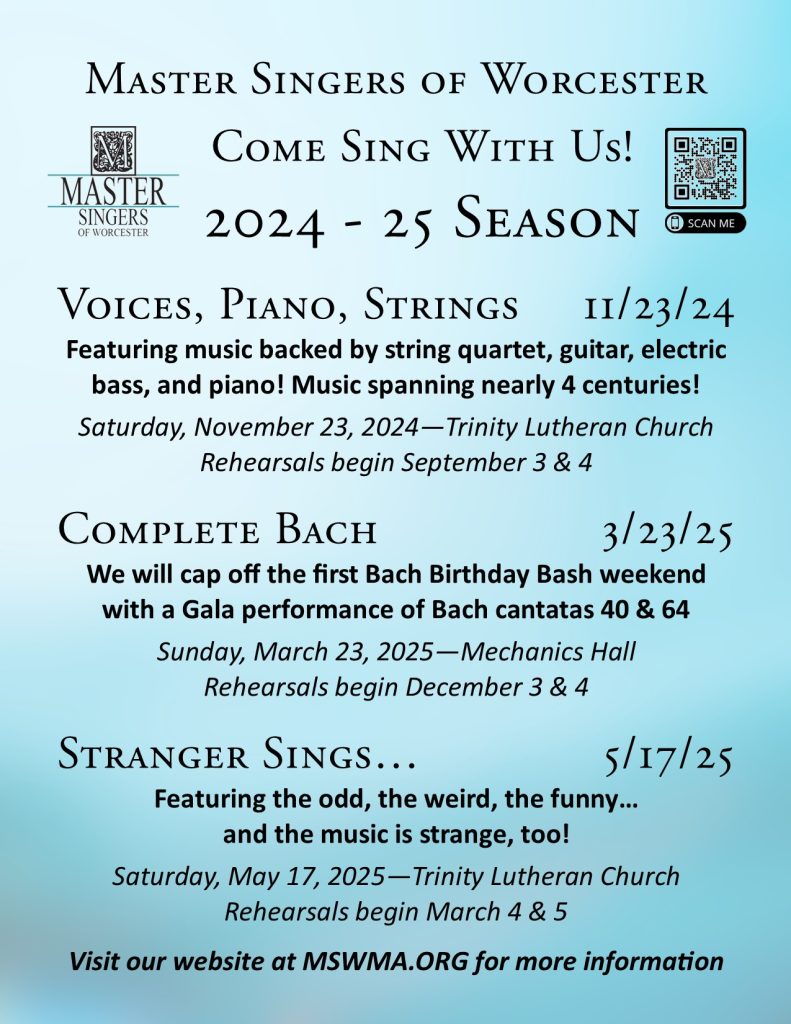The Master Singers of Worcester Sunday evening in Salem Covenant church presented an ingenious and thoughtful program titled “An Exploration of the Mass.” The Singers, led by Edward Tyler, brilliantly illuminated six key segments of the traditional Latin Mass as treated by 14 different composers across the last four centuries.
Thus, the Singers rendered the standard opening of the Mass, the Kyrie as composed by Palestrina who died in 1594, then Beethoven who died in 1827, and by Louis Vierne who died in 1937. The second segment, The Gloria, performed versions by Poulenc, Bernstein and Vivaldi; the third segment, The Credo, by Bach, and Stravinski; the fourth segment, The Sanctus, by Gounod, Mendelsohn and Ola Gjeilo (pronounced “yea-low”), a young Norwegian composer/pianist currently living in New York City; the fifth segment, The Benedictus, by Mozart alone, since he’s incomparable; and the final segment, The Agnus Dei, by Tomas Luis de Victoria, who died in 1611, and, of course, winding up with Papa Haydn, skimmed from his The Creation.
So, confronted with such a delicious feast of compositional achievements fastened to the sturdy, unchanging structure of The Mass any reviewer might try to find the key messages of such a gorgeous proliferation. This reviewer found several.
First, The Master Singers easily delivered their contrapuntal chops in the opening Palestrina, even with the deliberately limited tonal range; they then upped energy and decibels, naturally enough, for the Beethoven.
Second, it seemed the tonal power of conviction or automatic, unquestioning belief flowed most clearly in the earliest 16th- and 17th-century versions; the later treatments seemed to shift away from religious conviction to artistic individualism and calculated performance. Baroque Masses seem to say “God is real,” the later classical, romantic, modern Masses only said, “I am real.” Who wins? Hard to say, but Ola Gjeilo might obviate the argument.
And that’s the third message: There was astonishing conviction and power in his Sanctus from his “Sunrise Mass.” Veteran concertgoer Marj Hastings noted Gjeilo’s work was the most surprising and interesting of the evening, and she hoped, as does this reviewer, that the Master Singers will perform his entire Mass soon. On YouTube there is a version by the Vilnius Bel Canto Choir at https://www.youtube.com/watch?v=ZgnyzzJt7tg.
The video illustrates what Worcester one day might achieve if the combined chorale strengths of The Master Singers, Salisbury Singers and Worcester Chorus joined, say, Symphony Pro Musica and Worcester Chamber Music Society to produce the full scope of Gjeilo’s work. It does seem Gjeilo has slotted spirituality back into modern musicality, but it may be we’ll need at least a century of listening to determine whether the young Norwegian is Mozart, or just a more gifted Andrew Lloyd Webber.
In fact the Sanctus segment was a high point of the evening for this reviewer. The Singers’ opening by Gounod achieved a tonal power remarkable for an ensemble of just 24 vocalists and that lush sound carried over to Gjeilo’s version.
Additional messages: Mark Bartlett’s piano accompaniment easily overcame any longing for full orchestration; the several soloists who stepped forward from the group were spot-on, with special grace from bass Stephan Barnicle in Mozart’s Benedictus; whoever wrote the Program Notes did splendid work explaining the intricacies of this concert, and finally, without doubt, the Salem Covenant Church wins the Julia Child award for delicious Reception-Mastery.


